Bathroom countertops play a vital role in both the functionality and aesthetics of a bathroom. Choosing the right material can transform the space, making it more practical and visually appealing while withstanding moisture, heat, and daily wear. With the plethora of materials available, selecting the right countertop can be a challenging yet exciting task. Whether you’re designing a luxurious master bathroom or a practical guest bath, the countertop choice can elevate the design and give it a personalized touch.
One popular choice for bathroom countertops is granite. Granite has remained a favorite in both kitchens and bathrooms because of its durability, timeless beauty, and unique patterns. Each granite slab has a distinct design, which means your countertop will be one-of-a-kind. Granite is also resistant to heat and scratches, making it a practical choice for those who want a low-maintenance material.
However, granite requires occasional sealing to keep it resistant to stains and moisture. It’s available in a range of colors, from muted whites and grays to vibrant blues and greens, which can complement any bathroom style.
Another stylish option for bathroom countertops is quartz. Quartz is an engineered stone made from natural quartz combined with resins, which gives it excellent durability and resistance to stains and moisture. Unlike granite, quartz doesn’t need to be sealed, making it an even lower-maintenance choice. It comes in a variety of colors and patterns, some of which resemble natural stones like marble or granite. Quartz countertops are non-porous, making them an excellent choice for bathrooms where water resistance is crucial. The uniformity in its design makes it a top choice for those who prefer a sleek, modern look.
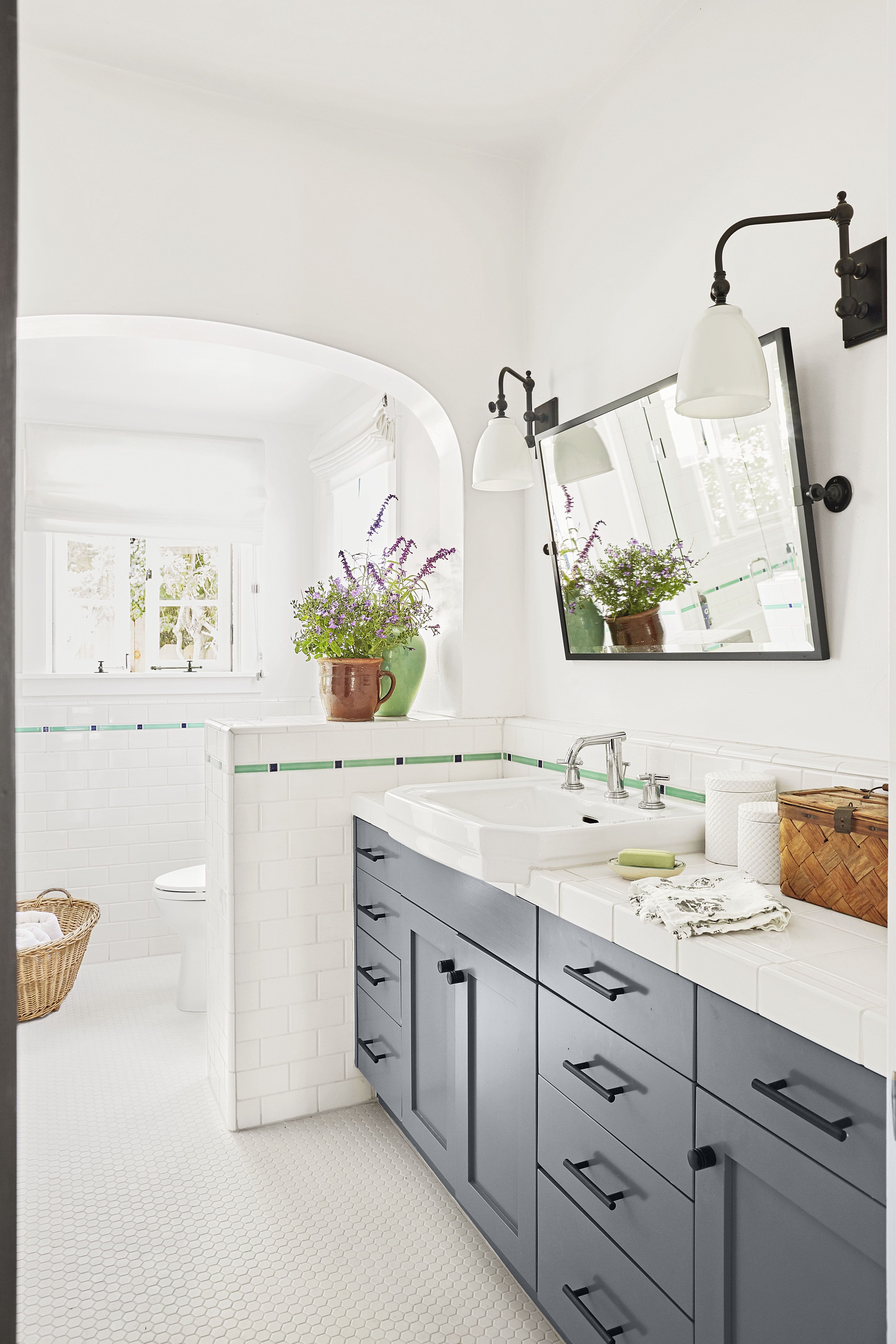
For homeowners seeking a luxurious and elegant option, marble is often the go-to material. Marble countertops provide a classic and sophisticated look that’s hard to match. Known for its beautiful veining and natural color variations, marble can instantly elevate the bathroom’s aesthetics. However, marble is more porous and softer than granite or quartz, making it susceptible to scratches, stains, and etching from acidic products. It requires regular sealing and careful maintenance but is worth it for those who value its natural beauty. Marble works particularly well in bathrooms with a classic or traditional design.
If you’re looking for a versatile and affordable option, consider solid surface countertops. Solid surface materials, like Corian, are made from acrylic or polyester resins mixed with pigments, resulting in a smooth, non-porous surface. They are available in a wide range of colors and patterns, even mimicking the look of natural stone.
Solid surface countertops are resistant to stains and easy to repair if scratched, as minor damage can be sanded out. They are not as heat-resistant as granite or quartz, but for bathrooms, they offer an affordable and stylish solution with low maintenance requirements.
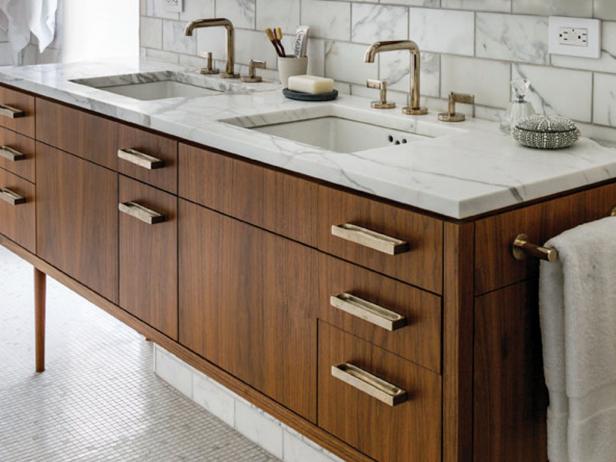
Concrete countertops have become increasingly popular in recent years, especially in modern or industrial-style bathrooms. Concrete is highly customizable, as it can be poured to fit any space and stained or tinted in virtually any color. You can even add textures or embed decorative elements like glass pieces or stones. While concrete is durable, it is porous and needs sealing to resist stains and moisture. Additionally, concrete countertops can develop small cracks over time, which adds to their rustic charm but may not suit everyone’s tastes. For those willing to invest in sealing and occasional maintenance, concrete offers a unique and highly customizable option.
Wood countertops can add warmth and a natural element to the bathroom. They are ideal for those looking to create a cozy, rustic, or Scandinavian-inspired bathroom. Woods like teak, oak, and walnut are popular for their beauty and resilience. Wood countertops need to be properly sealed and maintained to withstand moisture in a bathroom environment, as unsealed wood can warp or rot over time. Regular application of oil or sealant is necessary to maintain their condition. While wood may require more upkeep than other materials, its organic look and warmth make it a desirable choice for certain styles.
Laminate countertops are another budget-friendly option for bathrooms. They come in a wide range of colors and patterns, including designs that mimic stone and wood. Laminate countertops are relatively easy to install and don’t require sealing. They are resistant to stains but can be susceptible to scratches and heat damage. Laminate is a good choice for guest bathrooms or budget-conscious renovations. Though not as durable as stone or engineered materials, laminate offers great versatility and affordability, making it a practical choice for certain applications.
Glass countertops offer a modern and sleek aesthetic. Glass is naturally resistant to water, making it suitable for bathrooms, and it can be tempered to improve durability. Glass countertops can be customized in terms of color and finish, with options like frosted or textured glass adding an extra layer of style. They are easy to clean and maintain, but they are prone to fingerprints and smudges, which can be more visible on glass than other materials. While glass countertops are unique and visually striking, they require frequent cleaning to keep them looking pristine.
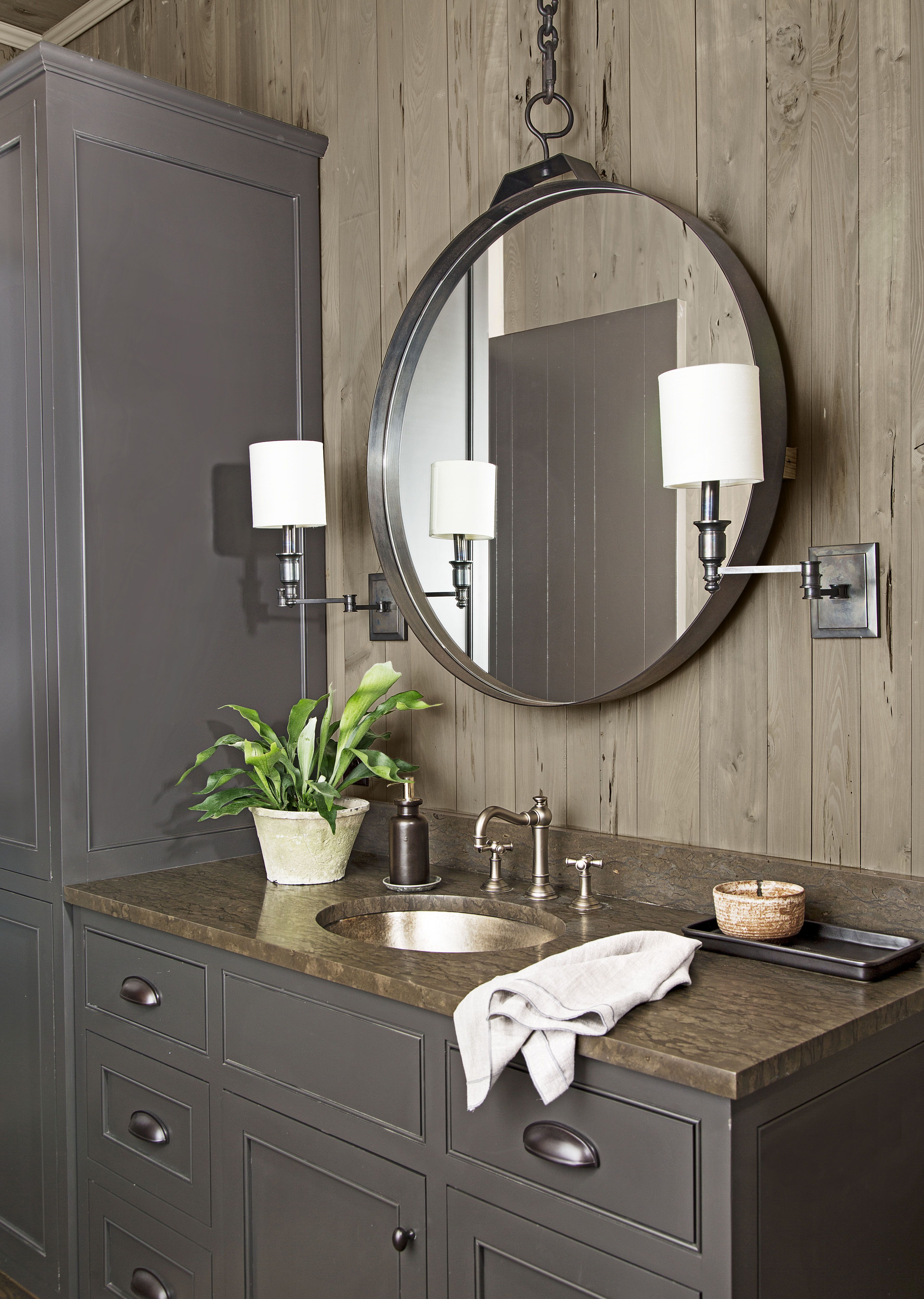
Porcelain countertops, traditionally used for tiles, are becoming a popular choice for countertop slabs. Porcelain is non-porous, making it highly resistant to stains, scratches, and heat, which is perfect for bathrooms. Porcelain countertops can be made to resemble marble or granite, providing a luxurious look without the same level of maintenance. They are available in a range of colors and finishes and are lightweight compared to stone countertops, which can simplify installation. Porcelain is a durable and stylish option, especially for those looking for an alternative to natural stone.
Stainless steel countertops bring a sleek, industrial look to the bathroom. Known for their durability, stainless steel countertops are resistant to heat, water, and stains. They are also non-porous and easy to clean, making them ideal for a bathroom setting. While stainless steel is commonly associated with kitchens, it’s gaining popularity in bathrooms, particularly in modern or minimalist designs. One downside is that stainless steel can show scratches and fingerprints, but these can often be polished out. Stainless steel countertops add a unique and contemporary touch to any bathroom.
For a truly unique look, recycled glass countertops are an eco-friendly choice that combines beauty with sustainability. These countertops are made by embedding pieces of recycled glass in a resin or concrete base, creating a colorful, mosaic-like appearance. Recycled glass countertops are durable, resistant to stains, and relatively low maintenance. They come in a variety of colors, and the embedded glass can create a distinctive look. However, these countertops are relatively heavy and may require additional support. For environmentally conscious homeowners, recycled glass countertops are an attractive and sustainable option.
Tile countertops have long been a popular choice for bathrooms due to their versatility and affordability. Tiles come in endless colors, patterns, and sizes, allowing for a high degree of customization. Tile countertops are also water-resistant and easy to clean, though grout lines can be susceptible to staining if not properly sealed. Ceramic and porcelain tiles are particularly durable options, and they work well in bathrooms with Mediterranean or bohemian styles. Tile countertops allow for creative designs, from mosaic patterns to more traditional looks, and they’re one of the more budget-friendly choices available.

Onyx countertops are a luxurious option for those looking to make a statement. Known for its vibrant colors and translucent properties, onyx can be backlit to create a stunning effect. However, onyx is softer and more delicate than granite or quartz, making it susceptible to scratches and stains. It requires regular sealing and care, but for those who are willing to invest the time, onyx can add an unparalleled elegance to a bathroom. It is ideal for those who want a unique and eye-catching countertop that’s more than just a functional surface.
Soapstone is another option worth considering, particularly for bathrooms with a vintage or farmhouse style. Soapstone is a softer natural stone, which makes it relatively easy to scratch, but it’s also non-porous and naturally resistant to bacteria, making it ideal for bathrooms. It develops a unique patina over time, which adds character. Soapstone countertops are easy to maintain with regular oiling, and they offer a classic, old-world charm that is hard to replicate with other materials. Its resilience to heat and moisture makes it a practical yet elegant choice.
Finally, terrazzo countertops are making a comeback, especially in contemporary and eclectic bathroom designs. Terrazzo is made by embedding chips of marble, granite, quartz, or glass in cement or resin, resulting in a speckled, colorful surface. Terrazzo is highly durable and resistant to moisture, though it may need occasional sealing. It’s available in a wide variety of color combinations, allowing for a highly customized look. Terrazzo adds a touch of retro charm to the bathroom and can be an ideal choice for those looking to add a pop of color and pattern to their space.
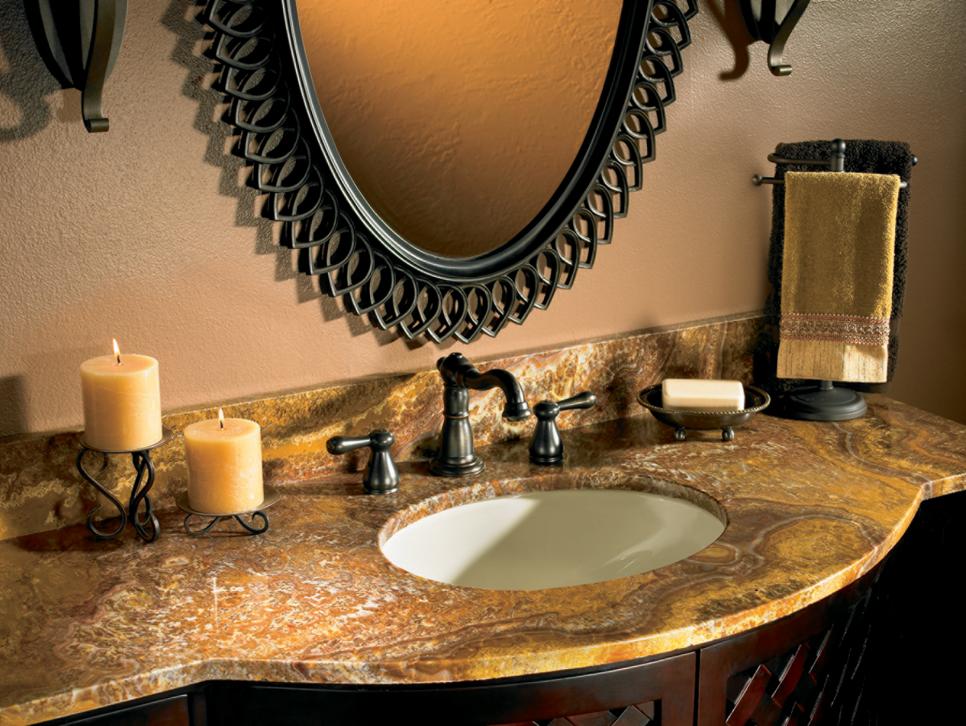
Common Mistakes to Avoid
Ignoring Maintenance Requirements: Some countertop materials require regular sealing or oiling, and neglecting these tasks can lead to stains, scratches, and water damage. For instance, marble and wood countertops need regular maintenance, and failing to do so can drastically reduce their lifespan.
Overlooking Water Resistance: Bathrooms are moisture-prone areas, and not all countertop materials handle water well. Avoid porous materials that are not adequately sealed, as they can absorb water and develop mold over time.
Focusing Solely on Aesthetics: While a beautiful countertop can enhance your bathroom’s look, it’s crucial to consider the durability and functionality of the material as well. A visually striking countertop may not be the best choice if it can’t withstand daily use and water exposure.
Selecting Dark Colors for Small Spaces: Dark countertops can make a small bathroom feel even smaller. Opt for lighter colors to open up the space and make it feel more inviting.
Mismatching with Bathroom Fixtures: Ensure your countertop material and color harmonize with your existing fixtures and cabinetry. A mismatch can make the bathroom feel disjointed rather than cohesive.
Overlooking Budget Constraints: High-end materials like marble and onyx can be pricey. Consider your budget carefully and explore cost-effective alternatives like laminate or solid surfaces if necessary.
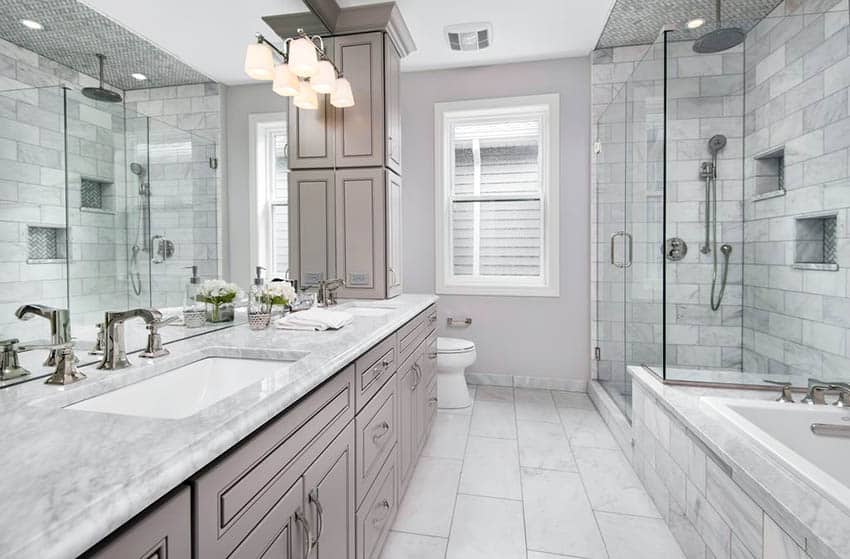
What is the most durable material for bathroom countertops?
Quartz and granite are both highly durable options for bathroom countertops. Quartz is non-porous and resistant to stains, making it ideal for high-moisture environments. Granite, while porous, is also very durable and can be sealed to improve its water resistance. Both materials withstand scratches and general wear well, offering longevity with minimal maintenance.
Are wood countertops suitable for bathrooms?
Yes, wood countertops can be suitable for bathrooms if they are properly sealed and maintained. Woods like teak are naturally resistant to moisture, but regular oiling or sealing is essential to prevent water damage. While they require more upkeep, wood countertops can add warmth and a natural aesthetic that complements certain design styles.
How often should granite countertops be sealed in a bathroom?
Granite countertops typically need sealing once a year in bathrooms, though this can vary based on the type of granite and its exposure to moisture. High-traffic bathrooms may require more frequent sealing, whereas guest bathrooms with less use may need it less often. Sealing helps protect granite from stains and keeps it looking polished.
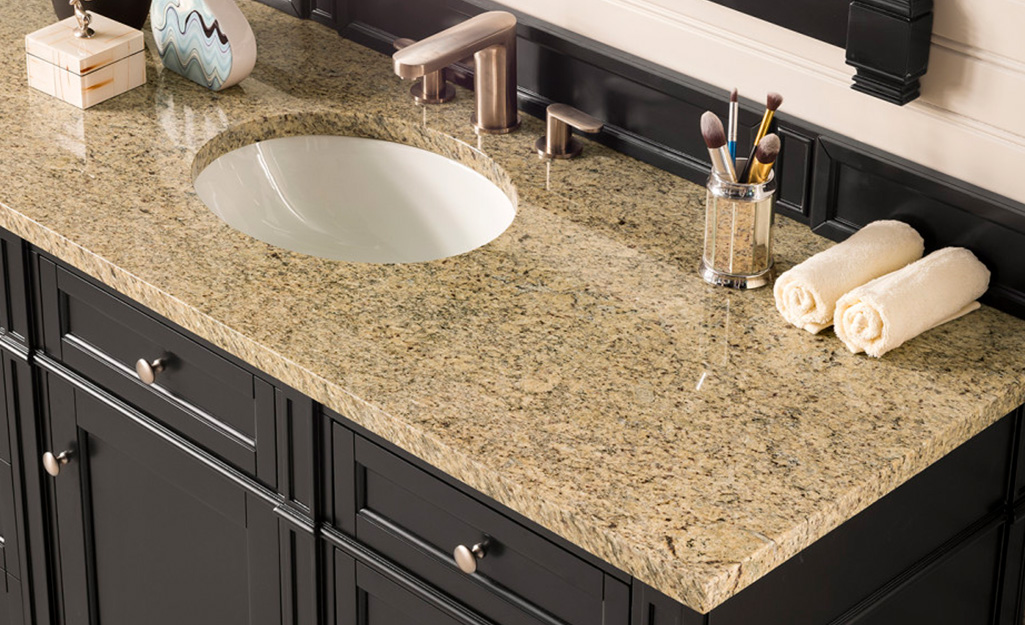
Can I install a laminate countertop in a bathroom?
Yes, laminate countertops can be installed in bathrooms, and they are a cost-effective option. They are available in many colors and patterns, including designs that mimic natural stone. However, they are less heat-resistant and prone to scratches, so they may not be as durable as stone or engineered surfaces in high-traffic bathrooms.
Is marble a good choice for bathroom countertops?
Marble is a beautiful choice for bathroom countertops, offering a classic and luxurious look. However, it is porous and prone to stains and etching from acidic substances, requiring regular sealing and careful maintenance. Marble may not be ideal for heavily used bathrooms, but it works well in spaces where aesthetics are a priority and maintenance is manageable.
What countertop material is easiest to clean?
Quartz, glass, and solid surface countertops are among the easiest to clean. Quartz is non-porous, so it resists staining and doesn’t harbor bacteria. Glass is also non-porous and can be wiped down easily, though it may show fingerprints. Solid surface countertops are also easy to maintain, as minor scratches can be sanded out, and they are resistant to stains.
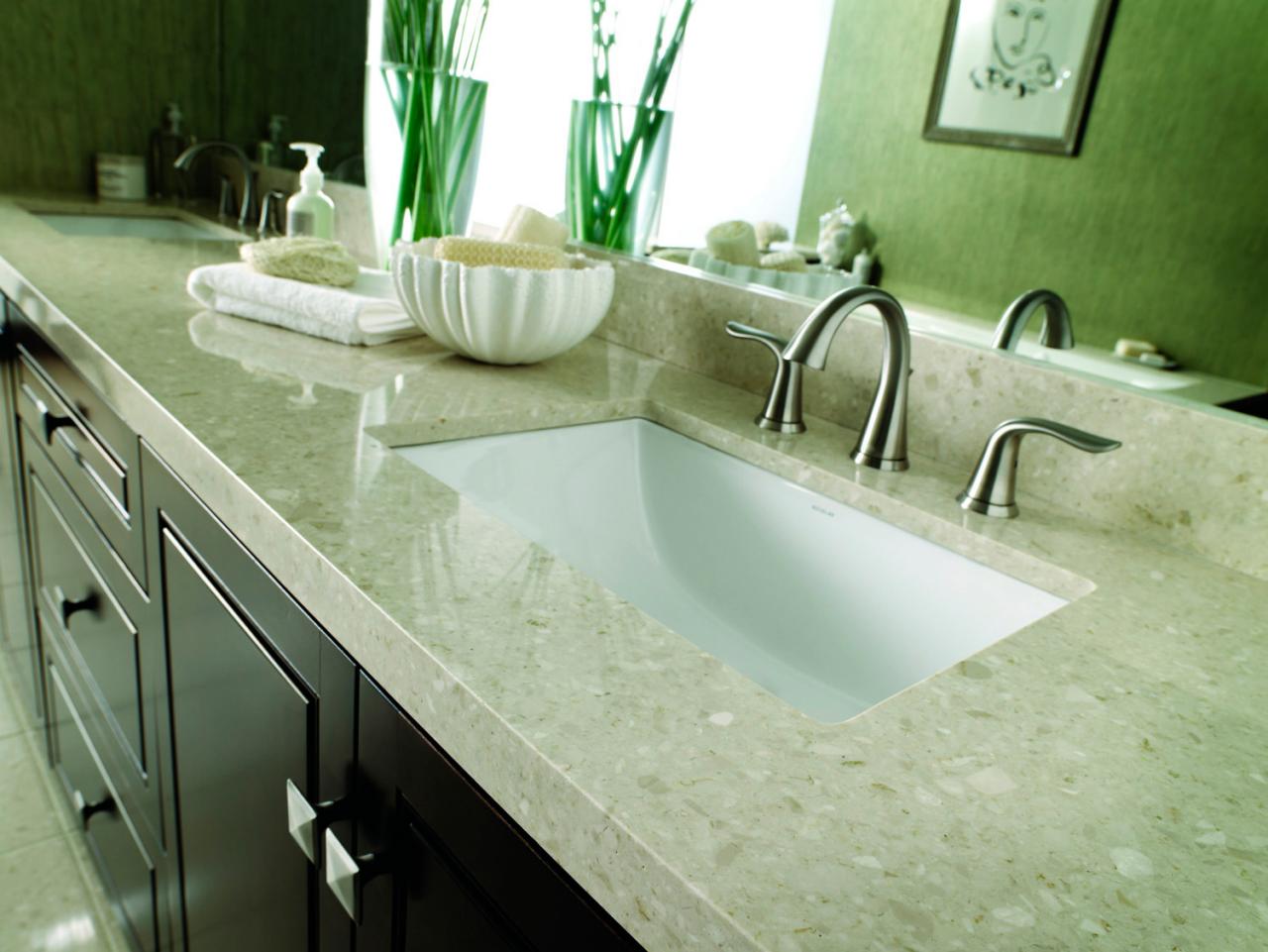
Related articles: